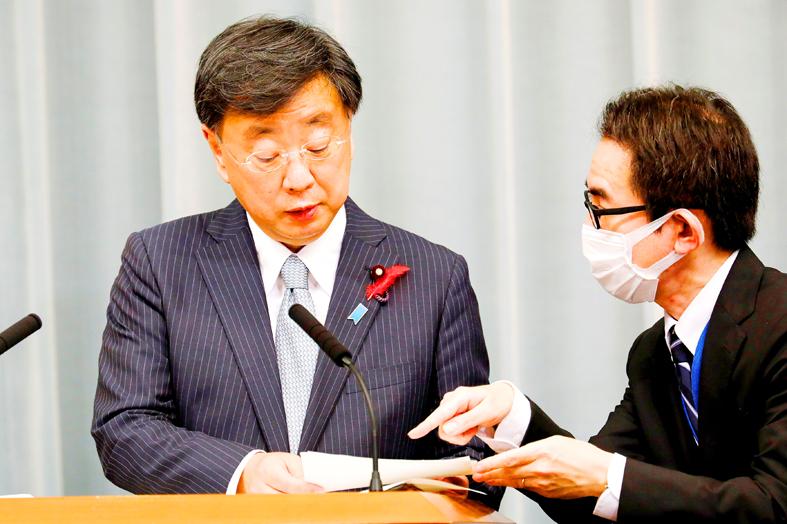The Japanese government yesterday said it would not send representatives to the Beijing Olympics as it called on China to respect human rights and the rule of law.
Government spokesman Hirokazu Matsuno did not describe the move as a diplomatic boycott — which has been announced by the US and others — but said there were “no plans” for officials to attend the Games.
“Japan believes it is important that common values shared by the international community, such as freedom, human rights and the rule of law, are also respected in China,” he said. “As Tokyo 2020 demonstrated to the world, the Olympics and the Paralympics are festivals of peace and sports.”

Photo: REUTERS
Australia, Canada, the UK and the Us this month announced diplomatic boycotts of the Beijing Olympics over what they consider to be widespread rights abuses by China, including against the Muslim Uighur minority.
Their boycott stops short of not sending athletes to the Games, which start on Feb. 4.
Beijing has said that the four nations would “pay the price” for the US-led campaign.
Japan, which hosted the Tokyo Olympics this year after the Games were postponed due to COVID-19, is in a tricky position as tensions simmer between the US and China, which are key trade partners.
Matsuno said that the decision had been made after “comprehensive” consideration, adding that Japan has held discussions with Chinese officials on human rights issues “at various levels.”
Tokyo 2020 Olympics Organizing Committee president Seiko Hashimoto and Japan Olympic Committee president Yasuhiro Yamashita would attend the Beijing Games.
“Hashimoto will attend to express gratitude and respect to the athletes and others who supported the Tokyo Games,” Matsuno said.
Japan Paralympic Committee president Kazuyuki Mori would attend the Beijing Winter Paralympics in March, he added.
Chinese Ministry of Foreign Affairs spokesman Zhao Lijian (趙立堅) said Beijing “welcomes the Japanese Olympic Committee and other relevant officials, as well as Japanese athletes,” but urged “the Japanese side to honor promises to support each other in hosting the Olympic Games and to not politicize sports.”

US President Donald Trump yesterday announced sweeping "reciprocal tariffs" on US trading partners, including a 32 percent tax on goods from Taiwan that is set to take effect on Wednesday. At a Rose Garden event, Trump declared a 10 percent baseline tax on imports from all countries, with the White House saying it would take effect on Saturday. Countries with larger trade surpluses with the US would face higher duties beginning on Wednesday, including Taiwan (32 percent), China (34 percent), Japan (24 percent), South Korea (25 percent), Vietnam (46 percent) and Thailand (36 percent). Canada and Mexico, the two largest US trading

AIR SUPPORT: The Ministry of National Defense thanked the US for the delivery, adding that it was an indicator of the White House’s commitment to the Taiwan Relations Act Deputy Minister of National Defense Po Horng-huei (柏鴻輝) and Representative to the US Alexander Yui on Friday attended a delivery ceremony for the first of Taiwan’s long-awaited 66 F-16C/D Block 70 jets at a Lockheed Martin Corp factory in Greenville, South Carolina. “We are so proud to be the global home of the F-16 and to support Taiwan’s air defense capabilities,” US Representative William Timmons wrote on X, alongside a photograph of Taiwanese and US officials at the event. The F-16C/D Block 70 jets Taiwan ordered have the same capabilities as aircraft that had been upgraded to F-16Vs. The batch of Lockheed Martin

GRIDLOCK: The National Fire Agency’s Special Search and Rescue team is on standby to travel to the countries to help out with the rescue effort A powerful earthquake rocked Myanmar and neighboring Thailand yesterday, killing at least three people in Bangkok and burying dozens when a high-rise building under construction collapsed. Footage shared on social media from Myanmar’s second-largest city showed widespread destruction, raising fears that many were trapped under the rubble or killed. The magnitude 7.7 earthquake, with an epicenter near Mandalay in Myanmar, struck at midday and was followed by a strong magnitude 6.4 aftershock. The extent of death, injury and destruction — especially in Myanmar, which is embroiled in a civil war and where information is tightly controlled at the best of times —

China's military today said it began joint army, navy and rocket force exercises around Taiwan to "serve as a stern warning and powerful deterrent against Taiwanese independence," calling President William Lai (賴清德) a "parasite." The exercises come after Lai called Beijing a "foreign hostile force" last month. More than 10 Chinese military ships approached close to Taiwan's 24 nautical mile (44.4km) contiguous zone this morning and Taiwan sent its own warships to respond, two senior Taiwanese officials said. Taiwan has not yet detected any live fire by the Chinese military so far, one of the officials said. The drills took place after US Secretary